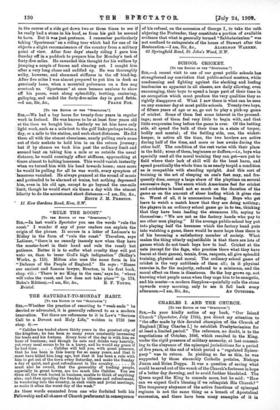THE SATURDAY-TO-MONDAY HABIT.
[To TIER EDITOR OF THE " SrlICT.LTOR."]
Sus,—Whether the practice of resorting to " week-ends " be decried or advocated, it is generally referred to as a modern innovation. Yet there are references to it in Law's "Serious Call to a Devout and Holy Life," written in 1726 (see chap. 4) :—
" Calidus has traded above thirty years in the greatest city of the kingdom; he has been so many years constantly increasing his trade and his fortune. Every hour of the day is with him an hour of business; and though he eats and drinks very heartily, yet every meal seems to be in a hurry, and he would say grace if he had time Calidus will tell you, with great pleasure, that he has been in this hurry for .so many years, and that it must have killed him long ago, but that it has been a rule with him to get out of the town eviary Saturday, and snake the Sunday a day of quiet, and good refreshment in the country It must also be owned, that the generality of trading people, especially in great towns, are too much like Calidas. You see them all the week buried in business, unable to think of anything else; and then spending the Sunday in idleness and refreshment, in wandering into the country, in such visits and jovial meetings, as make it often the worst day of the week."
As these words emanated from one who forfeited both his Fellowship and all cLance of Church preferment in consequence of his refusal, on the accession of George I., to take the oath abjuring the Pretender, they constitute a portion of available evidence that what is generally termed "Sabbatarianism" was not confined to antagonists of the house of Stewart after the


































 Previous page
Previous page